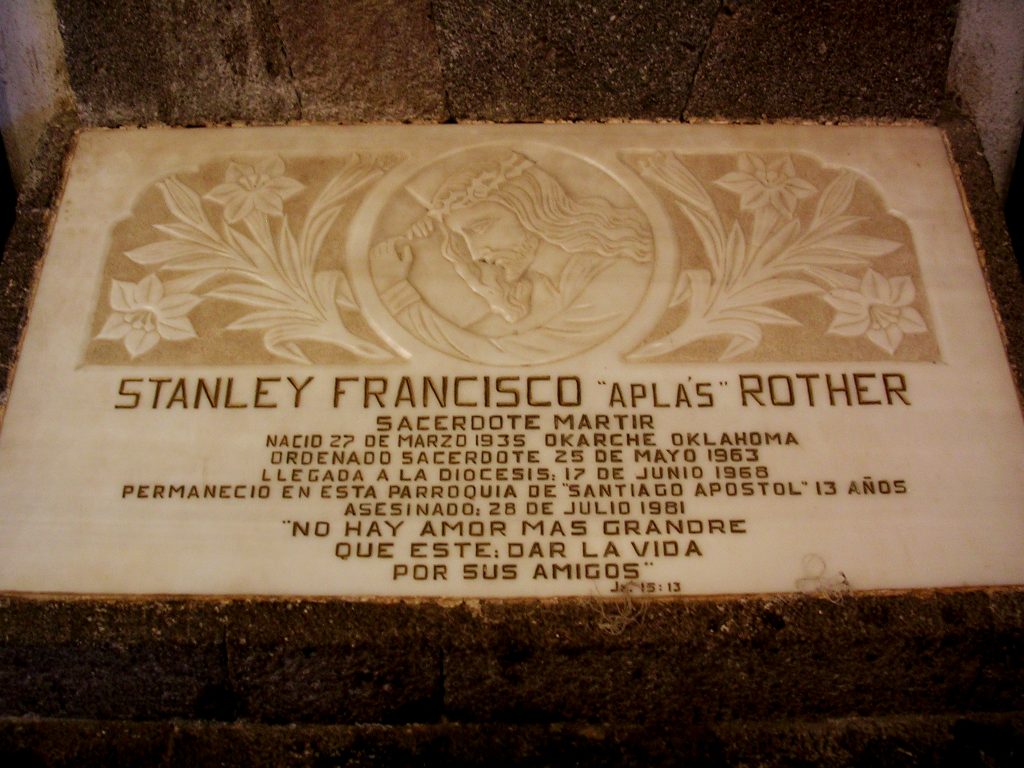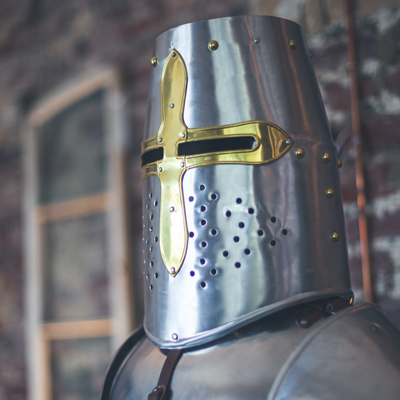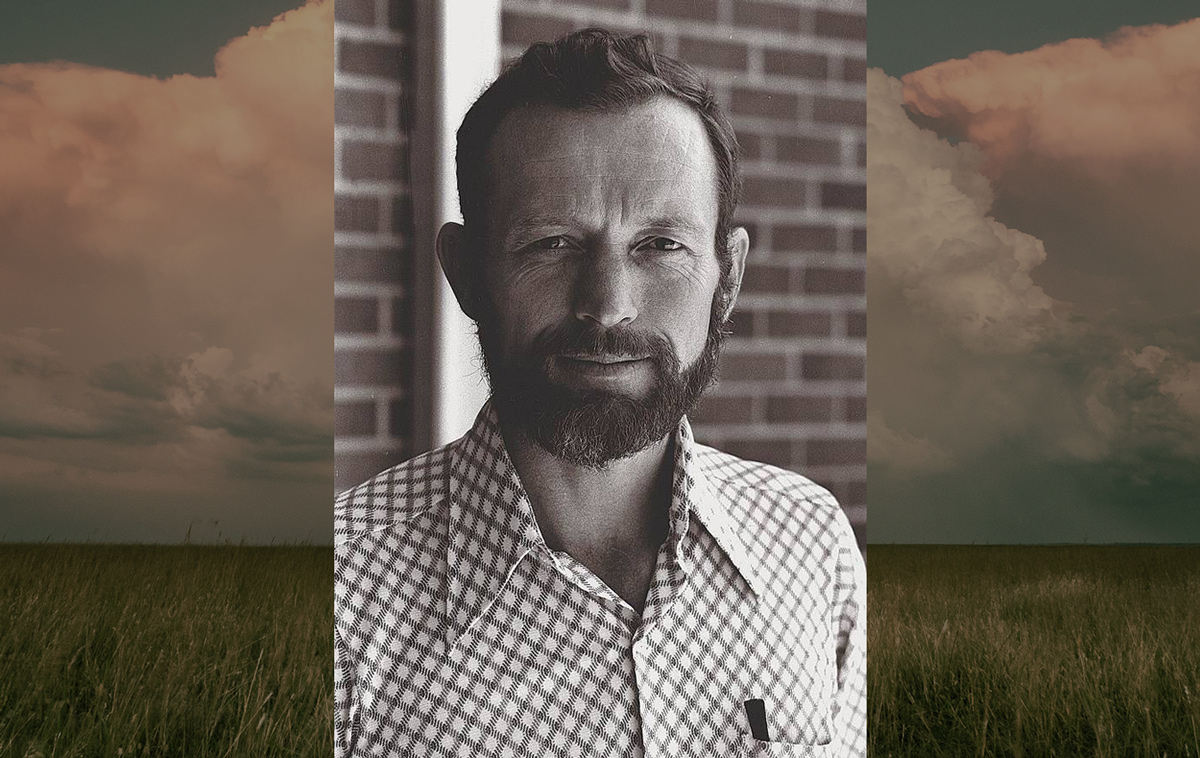Image: Bl. Stanley Rother, sourced from Wikimedia Commons, licensed under CC BY-SA 4.0
By Vir Christi
Bl. Stanley Rother
Pastor & Martyr
Born March 27, 1935
Died July 28, 1981
Feast Day: July 28
An American Witness
Never in the history of the Catholic Church has there been a canonized American-born martyr to the faith. The fact that he has been beatified, and his case for canonization is being examined, is cause for great excitement among American Catholics and demands that his story be told again.
Stanley was born in Okarche, Oklahoma, in 1935 and lived the life of an ordinary Oklahoman at that time. He was involved in the activities of his community, dedicated to the service of the local parish—Holy Trinity—and by all accounts was a hard worker in everything he did. In high school, he began seriously considering a vocation to the priesthood, and eventually entered Assumption Seminary in San Antonio; he would finish seminary formation at Mount St. Mary’s Seminary in Emmitsburg, Maryland. After serving as a priest for five years in the Archdiocese of Oklahoma, Stanley received permission to begin doing missionary work in Guatemala.
God’s Work in Guatemala
Father Stanley engaged with the Tz’utujil tribe, descendants of the Mayans, and lived side-by-side with them in their poverty. He celebrated Masses in their native language, as well as helping to translate the New Testament into their language. On top of the various liturgical functions Father Rother carried out for the Tz’utujil, he also helped them with their everyday chores. He used his farming expertise from Oklahoma to help them repair their equipment and improve the efficiency of their farming techniques, and labored alongside them in the fields during harvest time to help bring in the crops. Stanley Rother was a living embodiment of what it meant to serve the poor as instructed by Christ, and was well-loved by the people of the tribe as a result.
Guatemalan Government Trouble
While Stanley was carrying out his work, a civil war erupted in Guatemala between the militaristic government and the guerrilla forces who opposed them. As is frequently the case in civil wars, both sides demanded that every faction in the country pick a side to support. The Catholic Church attempted to remain neutral, as the Church’s primary focus was on faith formation and general education of the people, and subsequently many Catholics died at the hands of both guerrilla and governmental forces. Lists targeting enemies on the opposing side were issued by both the government and the guerrilla forces, and eventually Father Stanley’s name appeared on one such list. Initially, to protect his associates as well as himself, Father Rother chose to return home to Oklahoma.
However, after a short period of time, the devoted priest became restless. Telling people who knew him, “The shepherd does not run,” he made provisions to return to Guatemala knowing that it would likely mean his death.
Just a few months after Stanley’s return to Guatemala, three men broke into the rectory attached to his church and killed him; no one was ever held responsible. The community that he had served was devastated by his murder. They requested that his heart be kept enshrined in Guatemala, where it remains to the present day.

His Example for Us
“The shepherd does not run.” Those words should encourage and inspire us, but also provide a sobering reality of Christ’s calling in our lives. There are certainly times when our faith brings us great joy: weddings and First Holy Communions, watching new people brought into the Church at Easter, and amazing stories of people being reconciled with the Church after decades away uplift us. But our faith comes with a cost, as God warns us repeatedly throughout the Scriptures. A lot of times, we have a tendency to think of martyrs as having an almost distant quality to them. Many of them died a long time ago in places far from us, and so we can almost be dismissive of them and their sacrifice because it feels like it comes from another age.
The amazing thing about Father Stanley Rother is that he is a recent martyr to the faith, a witness for our time. Even more incredibly, he was born here and raised among the American people. Father Rother was poor in spirit and a beacon of light, daring us to be counter-cultural. We may not be called to the red martyrdom—dying for the sake of the faith—that Father Stanley was called to, but how can we die to self in our lives each day? Where are we allowing habits or material possessions in our lives that we could reasonably cut out?
Be brave, be bold, and remember Father Stanley’s statement that “the shepherd does not run.” If that is the mindset of a humble priest like Father Stanley Rother, imagine how much more the Good Shepherd will stay by your side if you seek His Will!

Vir Christi
Vir’s heart has been on fire for the Church from day one, and he dreams of the day when Constantinople will be a city again. He has a competitive drive satiated by sports and board games, but is also just as happy to sit down and read a good book for hours on end.






0 Comments